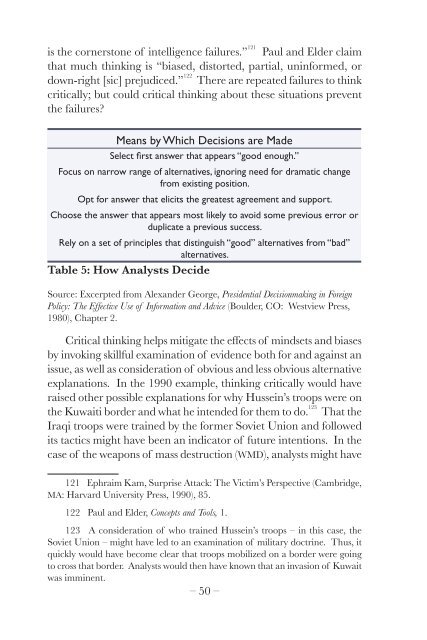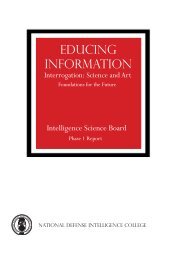Critical Thinking and Intelligence Analysis
Critical Thinking and Intelligence Analysis
Critical Thinking and Intelligence Analysis
Create successful ePaper yourself
Turn your PDF publications into a flip-book with our unique Google optimized e-Paper software.
is the cornerstone of intelligence failures.” 121<br />
Paul <strong>and</strong> Elder claim<br />
that much thinking is “biased, distorted, partial, uninformed, or<br />
down-right [sic] prejudiced.” 122<br />
There are repeated failures to think<br />
critically; but could critical thinking about these situations prevent<br />
the failures<br />
Means by Which Decisions are Made<br />
Select first answer that appears “good enough.”<br />
Focus on narrow range of alternatives, ignoring need for dramatic change<br />
from existing position.<br />
Opt for answer that elicits the greatest agreement <strong>and</strong> support.<br />
Choose the answer that appears most likely to avoid some previous error or<br />
duplicate a previous success.<br />
Rely on a set of principles that distinguish “good” alternatives from “bad”<br />
alternatives.<br />
Table 5: How Analysts Decide<br />
Source: Excerpted from Alex<strong>and</strong>er George, Presidential Decisionmaking in Foreign<br />
Policy: The Effective Use of Information <strong>and</strong> Advice (Boulder, CO: Westview Press,<br />
1980), Chapter 2.<br />
<strong>Critical</strong> thinking helps mitigate the effects of mindsets <strong>and</strong> biases<br />
by invoking skillful examination of evidence both for <strong>and</strong> against an<br />
issue, as well as consideration of obvious <strong>and</strong> less obvious alternative<br />
explanations. In the 1990 example, thinking critically would have<br />
raised other possible explanations for why Hussein’s troops were on<br />
the Kuwaiti border <strong>and</strong> what he intended for them to do. 123<br />
That the<br />
Iraqi troops were trained by the former Soviet Union <strong>and</strong> followed<br />
its tactics might have been an indicator of future intentions. In the<br />
case of the weapons of mass destruction (WMD), analysts might have<br />
121 Ephraim Kam, Surprise Attack: The Victim’s Perspective (Cambridge,<br />
MA: Harvard University Press, 1990), 85.<br />
122 Paul <strong>and</strong> Elder, Concepts <strong>and</strong> Tools, 1.<br />
123 A consideration of who trained Hussein’s troops – in this case, the<br />
Soviet Union – might have led to an examination of military doctrine. Thus, it<br />
quickly would have become clear that troops mobilized on a border were going<br />
to cross that border. Analysts would then have known that an invasion of Kuwait<br />
was imminent.<br />
– 50 –
















